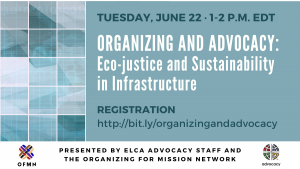from the ELCA advocacy office in Washington, D.C. – the Rev. Amy E. Reumann, director
Partial expanded content from Advocacy Connections: June 2021
HOUSING AFFORDABILITY | CLIMATE FINANCE SPENDING | TIGRAY REGION OF ETHIOPIA | PATH TO CITIZENSHIP | POLICING REFORM | UPCOMING EDUCATIONAL OPPORTUNITIES
 HOUSING AFFORDABILITY: Nearly 10% of Americans stand at risk of eviction or foreclosure. The Biden Administration in late May shared a final version of their proposed budget for the next fiscal year, with major proposed increases to housing programs at this critical time.
HOUSING AFFORDABILITY: Nearly 10% of Americans stand at risk of eviction or foreclosure. The Biden Administration in late May shared a final version of their proposed budget for the next fiscal year, with major proposed increases to housing programs at this critical time.
The proposed increases could take incremental steps in increasing housing affordability, as well as offer $800 million in new spending to help make homes more climate resilient and energy efficient. The ELCA Action Center currently has an active action alert in support of housing increases, and advocates are encouraged to send a customized message to their lawmakers as appropriators in the House of Representatives begins deliberations the week of June 24.
 CLIMATE FINANCE SPENDING: President Biden’s FY2022 proposed budget includes increases in international climate finance spending including funding for adaptation. ELCA staff met with members of Climate Special Envoy John Kerry’s team to get a better understanding.
CLIMATE FINANCE SPENDING: President Biden’s FY2022 proposed budget includes increases in international climate finance spending including funding for adaptation. ELCA staff met with members of Climate Special Envoy John Kerry’s team to get a better understanding.
Kerry’s team noted that the budget on international climate finance is considered a floor and not a ceiling. Domestically the budget includes funding for clean drinking water, high-speed broadband, and electric grid revamp.
 TIGRAY REGION OF ETHIOPIA: The U.S. announced it has imposed visa restrictions on current or former Ethiopian or Eritrean government officials, members of the security forces, or other individuals responsible for, or complicit in, undermining resolution of the crisis in Tigray which turned violent in November 2020, causing massive displacement and mobilizing the Lutheran World Federation (LWF) in the region.
TIGRAY REGION OF ETHIOPIA: The U.S. announced it has imposed visa restrictions on current or former Ethiopian or Eritrean government officials, members of the security forces, or other individuals responsible for, or complicit in, undermining resolution of the crisis in Tigray which turned violent in November 2020, causing massive displacement and mobilizing the Lutheran World Federation (LWF) in the region.
On top of other crises that Ethiopians have been dealing with lately, relates LWF, the violence in Tigray escalated when the Federal government and the Tigray regional forces clashed affecting millions. The ELCA has been advocating for increased humanitarian assistance to support those impacted by the conflict, and for the U.S. government to work with the international community to bring an end to this conflict. The visa restrictions include those who have conducted wrongful violence or other abuses against people in the Tigray region of Ethiopia, as well as those who have hindered access of humanitarian assistance to those in the region. The U.S. is also imposing wide-ranging restrictions on economic and security assistance to Ethiopia. It will continue humanitarian assistance and certain other critical aid to Ethiopia in areas such as health, food security, basic education, support for women and girls, human rights and democracy, good governance and conflict mitigation, consistent with available authorities.
 PATH TO CITIZENSHIP: As Congress continues to weigh various options to legislate a pathway to earn citizenship, one of the options on the table is for a pathway to citizenship for immigrant workers in the next recovery package, perhaps via a budget tool called “reconciliation.” A House budget resolution laying the blueprint for reconciliation is expected to be released around the week of June 21st, making input critical.
PATH TO CITIZENSHIP: As Congress continues to weigh various options to legislate a pathway to earn citizenship, one of the options on the table is for a pathway to citizenship for immigrant workers in the next recovery package, perhaps via a budget tool called “reconciliation.” A House budget resolution laying the blueprint for reconciliation is expected to be released around the week of June 21st, making input critical.
Leading up to this stage, advocates are participating in the #WeAreEssential Fast for Freedom, a multi-week fast to highlight the moral significance of action. Lutheran Church of the Reformation on Capitol Hill is a host site for the fast, which launched on June 9 and will continue for at least three weeks.
 POLICING REFORM: A bi-partisan group of Senators are working to find a compromise on the George Floyd Justice in Policing Act. ELCA advocacy activity continues to support the strongest version of this important legislation. The ELCA joined hundreds of organizations in a June 2020 statement around shared priorities for federal policing reform.
POLICING REFORM: A bi-partisan group of Senators are working to find a compromise on the George Floyd Justice in Policing Act. ELCA advocacy activity continues to support the strongest version of this important legislation. The ELCA joined hundreds of organizations in a June 2020 statement around shared priorities for federal policing reform.
The Justice in Policing Act attempts to address a number of these reforms. The bill, approved by the House in March, has not yet come to a vote in the Senate.
 UPCOMING EDUCATIONAL OPPORTUNITIES: Great summer virtual learning events to expand advocacy expertise, both on issues and in skillset, are coming up!
UPCOMING EDUCATIONAL OPPORTUNITIES: Great summer virtual learning events to expand advocacy expertise, both on issues and in skillset, are coming up!
 Organizing and Advocacy: Eco-justice and Sustainability in Infrastructure – Tuesday June 22, 1-2:00 p.m. EDT
Organizing and Advocacy: Eco-justice and Sustainability in Infrastructure – Tuesday June 22, 1-2:00 p.m. EDT
With pressing awareness of change needed for livable and sustainable communities, and with policy discussion on infrastructure shaping that change, join us to inform what you can do. Expertise from both ELCA advocacy staff and the Organizing for Mission Network will come together in this presentation and expand our capacity to respond to the challenges of our times. Register from http://bit.ly/organizingandadvocacy.
 ELCA Advocacy Network Conference Call: August Recess Possibilities – Thursday July 22, 1-1:30 p.m. EDT
ELCA Advocacy Network Conference Call: August Recess Possibilities – Thursday July 22, 1-1:30 p.m. EDT
Most years, the U.S. Congress recesses for the month of August. Senators and representatives return to their state and/or congressional district and reconnect with constituents. Reflect with ELCA advocacy staff on opportunities to interact with policymakers in-district and current priority issue updates. Registration forthcoming.
Five skill-building and issue-informing, virtual sessions will be presented by ELCA advocacy staff in collaboration with ELCA Peace Not Walls. Pick 1 or take all 5! Registration forthcoming.
August 11 – What is faith-based advocacy?
August 18 – How do I approach policy makers?
August 25 – How do I use media for impact?
September 1 – Let’s talk: About the Holy Land
September 8 Let’s talk: About immigration
Receive monthly Advocacy Connections directly by becoming part of the ELCA Advocacy network – http://elca.org/advocacy/signup , and learn more from elca.org/advocacy .

